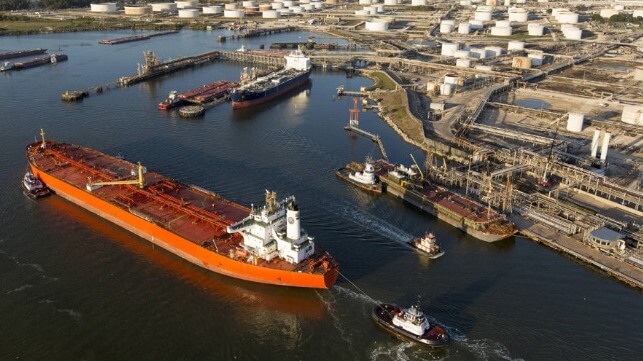Fuel Contamination Hits 11 Ships Bunkered in Houston

A fuel contamination issue is being traced to a single bunker supplier in the Houston area, according to VPS, a bunker fuel testing and advisory company. Eleven vessels using the fuel have reported loss of power and subsequent loss of propulsion while at sea according to VPS, which issued a bunker alert to its customers.
VPS believes the problems can be traced to fuel deliveries made by a single supplier between March and May 2023. They are reporting that the problems associated with these bunkers occurred after this fuel was combusted several weeks after bunkering.
One customer told VPS that the first sign of problems included a failure of the fuel pump and fuel injectors of the auxiliary engines. All three auxiliary engines subsequently faced the same issues and were unable to produce the required power resulting in a complete blackout and loss of propulsion.
The ship reported that auxiliary engine pumps exhibited significant leakage and the fuel injectors were ceased. Both, fuel pumps and fuel injectors required repeated replacement until no spares remained. They also reported problems with the fuel purification system being unable to handle the fuel. To keep the purifier operational, the main engines required running at lower than normal rpm, to reduce the fuel consumption thereby reducing the purifier feed rate.
They determined that the problems began after the vessel switched over to VLSFO (Very Low Sulfur Fuel Oil) bunkered in Houston. The vessel had to change to LSMGO (Low Sulphur Marine Gas Oil) to arrive safely to the port due to the reduced restrictions in power they were experiencing. They also said that the vessel also could not operate its thrusters resulting in restricted maneuverability.
VPS conducted testing reporting that it detected the presence of Dicyclopentadiene (DCPD) and associated isomers at significantly high levels in VLSFO bunker fuel deliveries in Houston. According to the company, these chemical contaminants which were detected using Gas Chromatography Mass Spectrometer analytical methodologies, are unsaturated chemical compounds that can polymerize and oxidize under certain conditions. They said that if these compounds start polymerizing, the fuel begins to exhibit a level of stickiness and become more viscous, making it difficult for moving components, such as fuel pump plungers and the fuel injector spindles to move freely. These effects cause damage to the fuel injection system. Over time excessive sludge formation is likely to be experienced.

that matters most
Get the latest maritime news delivered to your inbox daily.
The vessels that had been bunkered with the contaminated fuel reported fuel leakage in the ICU (Injection Control Unit) units and fuel pumps not being able to develop the required fuel pressure. Both main and auxiliary engines were affected although failures in auxiliary engines were more commonly reported.
This incident appears to have been less widespread than prior contamination reports. VPS, Maritec, and Lloyd’s warned of a similar incident in March 2022 with the bunkering of HSFO in Singapore. Over 200 ships were impacted and supplier Glencore Singapore had its license suspended by Singapore’s Maritime and Ports Agency after they found that the company continued to supply the contaminated fuel after tests uncovered the contamination.
